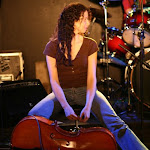
I played in the local Suzuki fundraiser concert/play-in yesterday. I'd originally wibbled about this because ideally Suzuki pieces are learned by heart, and other than 'Twinkle' and 'French Folk Song' on a good day I retain absolutely none of my early Suzuki pieces. Then again, I didn't originally go though the Suzuki method and therefore did not memorise them; my first teacher only used Books One and Two because they were well-done. Now, however, I am officially working in the Suzuki method, which is lovely and gentle and focuses on 'See what you did well there?' and 'That was good, now how can we make it better?' In other words, the approach I need so that I don't throw my hands up in the air and burst into tears because
I'll never get it, never, never, AUGH, why am I even trying? But I still don't have to memorise them, for which I am deeply, deeply grateful.
So I expected to demonstrate Epic Suzuki Fail because I needed sheet music. But it turns out that half of the back row of adults did and some of the third row of teenagers did too, so I was somewhat relieved.
I was also wibbly because
eep, people! But it turns out that one is very happily anonymous in a crowd of forty-odd cellists on stage, especially when one is in the back row. Go group Suzuki concerts!
To my astonishment the cellist leading our portion of the concert (which was first, yay for having big instruments that require chairs and setup) announced the hardest piece first, when I'd expected the performance to begin with the easiest pieces and progress to the more advanced music. The most advanced piece was the Breval sonata in C, which I'd played at my one and only recital ever about ten years ago. I knew this was to be on the playlist (it's in Book Four, I discovered) and I'd borrowed the Suzuki arrangement to look at it, but my teacher suggested that I might have enough on my plate what with orchestra and lesson work and prep for all the other Suzuki pieces to be performed. I agreed and didn't look at it again, but I put a copy in my music folder just in case. And as I'd warmed up by messing with it, I decided to play along, just for fun. And I messed up in the middle runs of triplets and one or two of the shifts, but I enjoyed it nonetheless.
I'd forgotten that Suzuki performances require the musicians to stand and bow smartly after every piece they've played. Heh.
And then things just got easier, and every piece there were more cellists who lifted their bows and played and took bows afterwards, right up to the last two songs which are the first two in Book One, where all the tiny cellists in the very front row were playing along. They were adorable and so well-behaved, waiting there on their little stools while everyone behind them played the more advanced pieces. It was like a musical game of Sardines.
Alas, there was a certain little boy in the audience who was not particularly well-behaved or patient. In fact, he had to be taken out of the theatre as soon as the solo cellist (who was a teenager who'd been sitting in front of me on stage, and her solo piece was was simply
brilliant) had finished her performance and the flutes had gone up to play, because he'd been so disruptive. After thinking about it we suspect it was the lights going down that did it: he couldn't see to colour or look at his books or play with his cars, so he was restless and squirmy and kept talking. At my orchestral concerts the lights don't dim, so this was unexpected. He knew we were upset at having to leave a third of the way through the concert, too, and he knew it was his fault. We talked about it on the way home and he now understands that he is expected to behave himself the way the little cellists on stage did, as the youngest of them was only a year older than he is. It's a respect thing, for the musicians as well as the audience around you. We will practise this. It was done and over with and there was no point in dwelling on it, but it still took both HRH and I a good couple of hours to shake our residual vibrating-with-anger-and-mortification. I did get a nice apology from the boy while I was changing out of my concert clothes, saying he was sorry he had been bad and we had had to leave, and promising that next time he would be very quiet at my concert. I have four (!) coming up between the end of March and the beginning of July, so he'll have plenty of opportunity to demonstrate his dedication.
He has decided he wants a flute now, too. I'm thinking it's a good thing we left before he saw the violins.
This year's fundraiser was for Sun Youth, and judging from the number of people there (mostly families, of course, but even so) there was a decent amount raised.
Now I can go back to focusing on orchestral work, with a side order of lesson work.
~
*
The original post at Owls' Court*
Owls' Court: the main journal~



